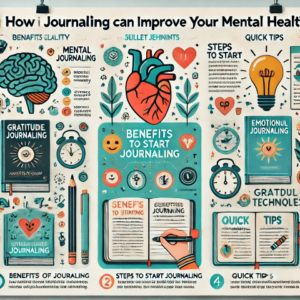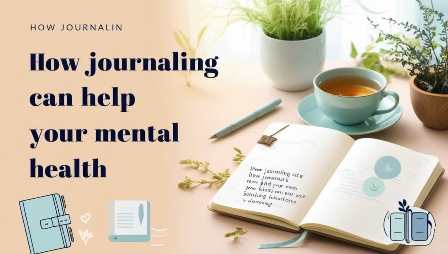How Journaling Can Help Your Mental Health is evident through its ability to reduce stress, enhance self-awareness, and promote emotional well-being. Journaling is one such great tool, a simple but transformative activity. Let’s look at how journaling can benefit your mental health and help you live a more balanced life.
What is journaling?
Journaling is the written record of one’s thoughts, feelings, and experiences. It’s not simply about keeping a diary; it’s a deliberate act of self-reflection and expression. Whether you use a classic notebook, a digital app, or a guided diary, writing can be extremely soothing.

| Topic/Aspect | Key Points |
|---|---|
| Benefits of Journaling for Mental Health | – Reduces stress, anxiety, and depression. – Enhances emotional well-being. – Improves self-awareness. – Encourages mindfulness and relaxation. |
| How Journaling Helps with Anxiety | – Journaling allows you to externalize anxious thoughts. – Reduces mental clutter, allowing you to focus. |
| Journaling Techniques for Stress Relief | – Expressive writing, free writing, or bullet journaling. – Guided prompts can help manage emotions. |
| Connection Between Journaling & Emotional Well-being | – Helps to release pent-up emotions. – Facilitates emotional healing and understanding. |
| Journaling Prompts for Improving Mental Health | – “Write about something you’re grateful for today.” – “What’s causing you stress today?” |
| How to Start a Mental Health Journal | – Set a regular time each day for journaling. – Choose a quiet, comfortable space. – Begin with short, simple entries. |
| Guided Journaling for Mental Clarity and Focus | – Focus on clarity by asking questions like “What’s the most important task for today?” – Write down short-term and long-term goals. |
| Journaling Tips for Overcoming Depression | – Write about positive memories or affirmations. – Record progress to track small victories. |
| Positive Effects of Journaling on Mental Health | – Reduces negative thoughts. – Promotes a positive mindset. |
| How to Make Journaling a Daily Habit for Mental Health | – Set aside 5-10 minutes daily. – Keep a journal nearby to write whenever inspiration strikes. |
| Journaling Ideas for Managing Overwhelming Emotions | – Use prompts like “What am I feeling right now?” – Write about possible solutions to the issue. |
| How Journaling Helps Improve Self-awareness | – Reflecting on your thoughts allows a deeper understanding of emotions and behavior. |
| Best Types of Journals for Mental Health Tracking | – A simple lined notebook, guided journals, or apps for digital journaling. |
| How to Journal for Better Sleep and Reduced Anxiety | – Write a “to-do” list for tomorrow to release worries. – Reflect on calming events from the day. |
| Benefits of Expressive Writing for Emotional Healing | – Releases pent-up emotions. – Reduces emotional distress and mental fatigue. |
| How Journaling Supports Mindfulness and Relaxation | – Fosters present-moment awareness. – Helps you tune into thoughts and feelings without judgment. |
| Science Behind Journaling & Mental Health | – Studies show that journaling can lower cortisol levels, reducing stress. – Improves mood and cognitive function. |
| Daily Gratitude Journaling for a Positive Mindset | – Focus on 3 things you’re grateful for each day. – Encourages a positive perspective on life. |
| Therapeutic Journaling Exercises for Stress Management | – Use prompts that focus on relaxation, like “Describe your ideal peaceful day.” – Use “Stream of consciousness” writing to relieve stress. |
| How Journaling Can Boost Self-Confidence & Self-Esteem | – Writing about successes, strengths, and affirmations increases self-worth. |
This table outlines key takeaways for each aspect of journaling as it relates to mental health improvement.
Advantages of Journaling for Mental Health
Stress relaxation: Journaling allows you to release your anxieties and gain clarity, giving you a sense of relaxation.
Emotional Regulation: Writing about your feelings helps you process them more effectively.
Journaling promotes better self-awareness by allowing you to dwell on your thoughts.
Improved Focus: Journaling helps you organize your ideas and concentrate on what’s important.
The science of journaling and mental health
According to studies, expressive writing can reduce cortisol levels, the stress hormone, while also improving emotional well-being. Writing activates the brain’s processing regions, allowing people to cope with trauma, anxiety, and stress more efficiently.
How Can Journaling Help With Anxiety?
When you journal, you externalize your issues rather than allowing them to fester inwardly. Writing can help you recognize triggers, overcome unjustified anxieties, and develop a problem-solving mindset. For example, keeping a worry notebook allows you to organize your issues and handle them in a systematic manner.
Journaling Techniques for Stress Relief
- Stream of consciousness Writing: Write freely, without regard for grammar or structure.
- Gratitude Journaling: To move into a positive mentality, focus on what you are grateful for.
- Mindful Journaling: Use mindfulness and journaling to stay present and focused.
- Bullet Journaling: Use brief points and pictures to effectively manage stress.
How to Start a Mental Health Journal
Starting a journal may appear difficult, but here’s an effortless guide:
Choose your medium: Choose a notebook or a digital app that seems comfortable.
Set a Routine: Set aside a certain time each day, even if it’s only 5-10 minutes.
Start Small: Begin with simple questions such as, “How am I feeling today?”
Be Honest: Write truthfully, without concern for perfection.
Journaling prompts to improve mental health.
If you aren’t sure what to write, try these prompts:
- What made me so joyful today?
- What am I grateful for?
- What challenges do I have, and how can I overcome them?
- How do I want to develop emotionally this week?
Journaling Tips for Overcoming Depression
For people suffering from depression, journaling can be a source of hope. Concentrate on positive reinforcement, such as recording achievements or reflecting on strengths. Guided journaling for mental clarity and focus might help you organize overwhelming emotions.
How journaling promotes mindfulness and relaxation.
Journaling goes nicely with mindfulness practices. Writing on your current experiences or focusing on your breath while journaling might help you feel calmer and more relaxed.
Incorporating mindfulness practices into journaling enhances its therapeutic benefits.
Daily Gratitude Journaling: Maintaining a Positive Mindset
Gratitude journaling entails writing down what you’re grateful for every day.
This exercise rewires the brain to focus on positive events, increasing general pleasure and decreasing negative thought patterns.
Therapeutic Journaling Exercises for Stress Management
Visualization Exercise: Write about your ideal calm location for mentally escaping stress.
Release Writing: Write a letter to your worries and then shred it up as a symbolic gesture.
Emotion Mapping: In your notebook, associate feelings with different colors or symbols.
Best Journals for Mental Health Tracking
Mood Journals: Keep track of your emotions and uncover patterns.
Gratitude Journals: Concentrate on the positive parts of life.
Dream journals: Keep track of and study your dreams to gain insights.
Bullet Journals: Combine organization and mental health tracking.
Journaling can increase your confidence and self-esteem.
Journaling allows you to acknowledge accomplishments and celebrate your progress. Reflecting on personal progress helps you gain a stronger feeling of self-worth and confidence in your talents.
How to Establish a Daily Journaling Habit for Mental Health
Keep your journal accessible: keep it somewhere you can readily reach it.
Pair it with Existing Habits. Journal after a meal or before bedtime.
Begin small: Commit to writing one sentence every day.
Celebrate Consistency: Reward yourself for sticking to your regimen.
Positive Effects of Journaling on Mental Health
Reduces symptoms of anxiety and sadness.
Improves emotional intelligence.Enhances problem-solving ability.Boosts resilience during difficult circumstances.
Conclusion
Journaling is a powerful, simple, and inexpensive method for improving mental health. Whether you’re dealing with anxiety, seeking mindfulness, or simply trying to better understand yourself, writing can help you achieve emotional clarity and resilience. Begin your journaling journey today; your mind and heart will appreciate it.

